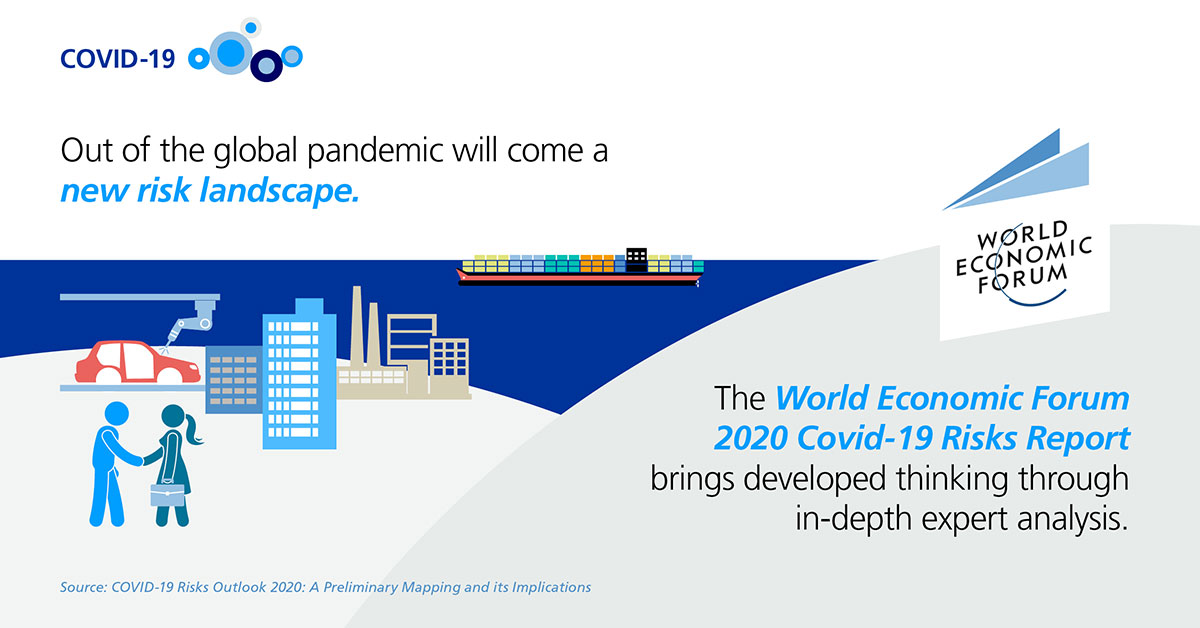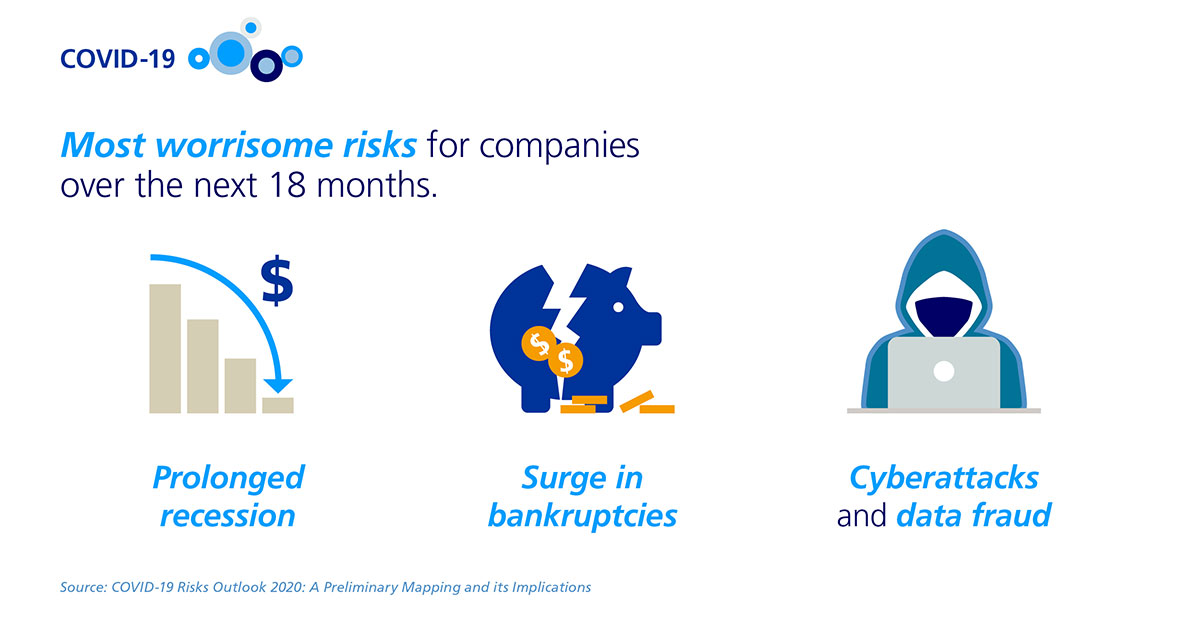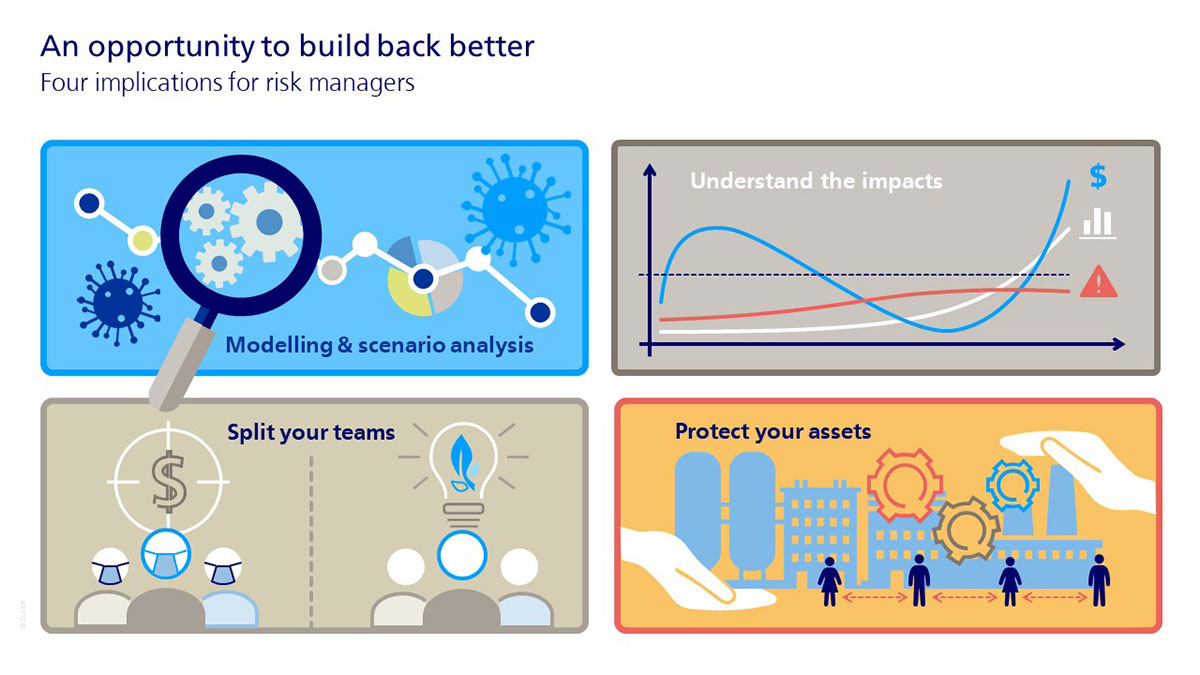COVID-19 Risks Outlook: A Preliminary Mapping and its Implications
GlobalArticle19 May 2020
The WEF COVID-19 Risks and Interdependencies Outlook report presents a collection of possible risk-based consequences from the coronavirus and its potential second-order effects. This report takes advantage of the views of 347 senior risk professionals who participated in the COVID-19 Risks Perceptions Survey.
The report aims to identify the emerging concerns and fallouts from COVID-19 over the next 18 months, analyze the pandemic's implications and effects beyond the immediate crisis response, and provide cross-cutting insights on the current risks landscape that would not otherwise be available. The perspective of the business community on these global concerns is reflected, not just in the business impact and risks, but in the broader global consequences
We are in a healthcare crisis that is also an economic crisis and an energy crisis. The length and depth of the economic crisis will depend on solving the healthcare crisis with an exit strategy involving a combination of an effective, widely available vaccine and therapeutic drugs. What is clear is the interdependencies of the global risks triggered by the COVID-19 pandemic. We are experiencing an historic event that will change many aspects of the world we live in, the geopolitics, the economic impact on many industry sectors, the competitive business landscape, the long-term societal impacts such as an exacerbation of inequality, consumer behaviors, the nature of work and the role of technology at work and at home.

Key messages from the report are;
Economic risks are the most likely and concerning fallout, in particular the risk of a prolonged recession of the global economy. That in itself is not surprising, but these risks also have far-reaching environmental, societal and technological implications and interconnections. An increase in indebtedness, both public and private will inevitably push some companies into bankruptcy.
One of the most important fallouts for the world of dealing with such a global crisis as COVID19 is ignoring other existential global risks. In this case a shortfall of activity to address climate change adaptation and mitigation. As countries emerge from the immediate health crisis and reboot their economies, changed working practices, attitudes towards travelling, commuting and consumption might make it easier to find business opportunities to capitalize on a lower carbon and more sustainable recovery.

In addition to the dangers to public health, the pandemic and the resulting lockdowns and shutdowns, could have long-lasting effects on people and societies. High structural unemployment is likely to affect consumer confidence, and the speed of economic recovery as well as exacerbate inequality, mental health problems and lack of societal cohesion.
Although technology has been central to the way people, companies and governments have managed the COVID-19 crisis, it is also challenging the relationship between technology and governance, while mistrust or misuse of technology could have long-lasting effects on society. New business and employment opportunities are being created, but a greater dependence on technology has also increased cybersecurity risks
For business people there are many decisions that are being taken now and in the coming months that will determine how to respond, as these risks or opportunities emerge and play out. In particular these include;
- To what extent do we manage the operational trade-offs between a quick return to work, but still protect our employees and customers?
- At a time of change for our business, with changing industry structures, changing competitive positions, how do we not only survive, but also find the silver linings?
- How can we accelerate our commitments to sustainability and drive a low-carbon transition?
- How will consumer behavior change in our sector and how will that affect our propositions and the way we deliver them?

For risk managers and business people, in addition to all the current risk management activities designed to protect employees and customers in the immediate crisis, there are a number of recommendations of how to deal with this future uncertainty
- Modelling and scenario analysis: Use skills developed in economic scenario modelling to apply to Covid-19, using a range of scenarios to explore how the future may develop and create agile responses.
- Build scenarios into existing risk models to understand the impacts of different recovery rates on business, operational, credit or market risks.
- Split your teams; one team to manage the immediate consequences of Covid-19, focused on bringing back business. A second team to envision the future and find new opportunities as the competitive landscape and customer-behaviors change
- Ensure that appropriate measures are in place to protect physical and other assets that are currently idle, or re-purposed, so that they can be re-started quickly, once normal business activities are resumed
Watch the Report Presentation Webinar

